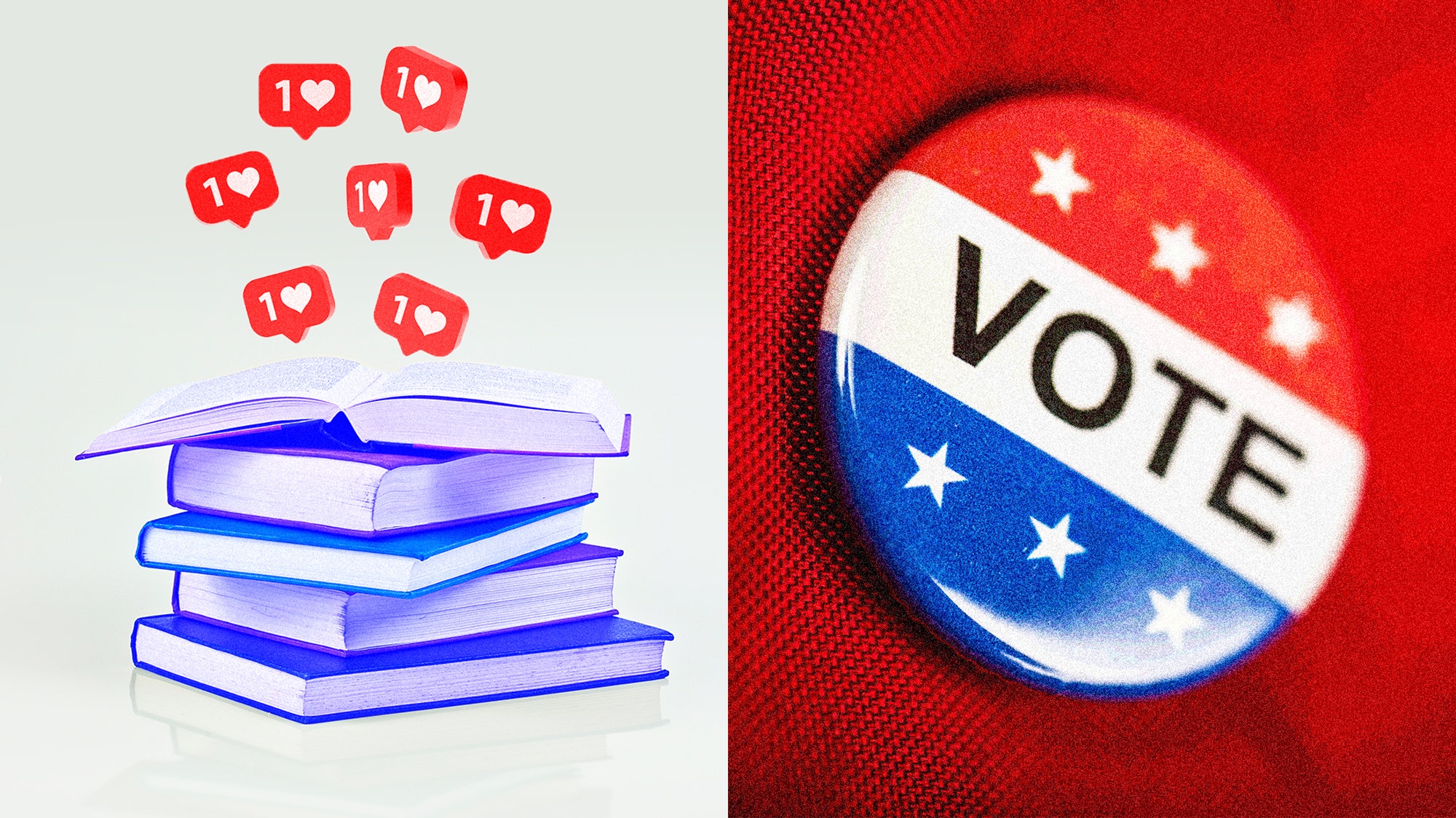TikTok creator @lizabookrecs had a question: When did BookTok become political? It was in the hours after Donald Trump had won the election for US president and the subset of TikTok that likes to talk about literature was already starting to fracture. People had started unfollowing fellow BookTokkers whose views didn’t align with their own—mostly people who’d expressed support for Trump—and a lively debate was growing about whether or not the space was a political one. In her post, @lizabookrecs professed, “We don’t need politics ruining a good thing we have going.”
By the following Monday, it seemed as though this crumbling of BookTok had already come to pass.
Unfollow lists, sometimes called red lists, began to circulate. In response, some creators posted that they were beginning to follow red-listed creators as a show of support. Creators asked Trump-supporting followers to get lost. For every person claiming that an online community built around discussing books shouldn’t be a community for discussing politics, there was another person pointing out that most great works of literature have at least some perspective on societal affairs. “You voted for this future,” TikTok user @_onesteph said, holding up a copy of Margaret Atwood’s The Handmaid’s Tale.
A few folks stitched @lizabookrecs’ video, which has more than 100,000 views so far and echoed the sentiments of several TikTok users, to respond. Romance novelist J.J. McAvoy likened the post to violence: “When someone tells you, ‘This space is not for’ whatever it is, they are just trying to make you shut up so they can get on with pretending that everything is OK for them.”
In the week since Trump beat Vice President Kamala Harris, these types of arguments have been brewing in all kinds of online communities. Often, the arguments wind their way to the same end point: If this is a corner of the internet dedicated to one form of discussion, why would people now use it to talk about politics? A fair question, but one that implies that politics doesn’t touch nearly every aspect of people’s lives and hobbies. Car enthusiasts could easily wind up talking about Elon Musk and Tesla, or overseas manufacturing, or the merits of EVs. Space enthusiasts could easily find themselves in, well, a discussion about Elon Musk and SpaceX, or privatization of spaceflight.
Books are the same—and different. While, yes, books like The Handmaid’s Tale or Atlas Shrugged or The Hunger Games series confront real political issues with fiction and allegory, many books are also the subject of political persecution of a sort. According to the American Library Association, there were 414 attempts to censor books in public, school, and academic libraries in the US between January 1 and August 31 of this year. That number is down slightly from the 695 attempts made in the same period in 2023—which saw a lot of attention focused on books by or about people of color or the LGBTQ+ community—but still far outpace the numbers in years prior to 2020. Efforts nationwide have sought to remove queer books from schools, and PEN America found that there were 10,046 instances of book bans during the 2023–24 school year. Those bans often come, according to PEN, when the guidance of educators and librarians “are overridden by school boards, administrators, or even politicians on the basis of a book’s content.”
“I find the discourse around books not being political to be not only harmful to readers [but] a bit insulting to the authors who have spent so much time creating those stories,” McAvoy says when reached by email. “All books have messages, and if you simply decide to ignore them or pretend they don't exist, what is the purpose of us writing to begin with?”
As news of Trump’s win hit BookTok (and TikTok broadly), a narrative emerged that the new administration wouldn’t result in new book bans, one that quickly intertwined with the “BookTok shouldn’t be political” thread. As one poster claimed that smut and dark romance wouldn’t be banned, another chimed in with a stitch to point out that readers can still be concerned even if the books they enjoy aren’t specifically the ones under threat.
As Lia Shields, a creator in Colorado, notes, romance novels can also be political. As she pointed out in a TikTok that has since earned more than 13,000 views, many of the protagonists in the books she reads could one day have rights women in the US don’t. “Thankfully I live in a blue state,” she tells me, “but if I did not live in a blue state, they’d have more rights to their bodies than I do in real life. That’s frightening.”
BookTok collapsing into different factions could have long-term impacts. The platform has become a place that not only launches new authors but also brings older books to new audiences of younger readers. (Last year, TikTok held a Book Awards in the UK and Ireland; one of the nominees for Best BookTok Revivial was George Orwell’s 1984.)
A few days after the US election, author Kaleigh Michele posted a TikTok saying she’d been red -listed based on assumptions that she was a Trump supporter. “I’m a brand new author. I’ve only published one book,” the TikTok text read. “I’m currently working on three new ones and suddenly have people trying to ruin my name, my passion … If I didn’t support a party prior to this, I most definitely do now! … As for me, I’m currently adding every author ‘red listed.’” In addition to the obligatory #fyp, the post had three hashtags: #redlist, #booktok, #trump.

